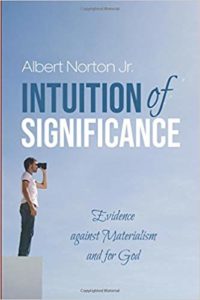Why am I here? What is “here?” What constitutes all of reality?
The default view in our culture isn’t neutral, but is a coherent philosophy which we can identify and articulate. A reasonably accurate name for it is materialism: the view that all of reality consists only in physical things, and the forces acting on them. An opposing view, theism, tells us there is a spiritual realm, too, which pervades the physical. 
In our post-Christian culture, the default perspective is materialism, yet we tend to self-identify in reference to religion. We might say “I’m not very religious,” for example, defining our views by what they are not, rather than what they are. This feels neutral, but amounts to an embrace of materialism.
We should look critically at these competing metaphysical views, theism and materialism, and follow the evidence where it leads. Intuition of Significance/Evidence Against Materialism and for God traces the fault line between them, examining evidence like the fact of being; our incessant yearning; our competing desires both for significance and insignificance; and our subjective motivations regarding beauty, morality, and truth, to show they all point to God.
